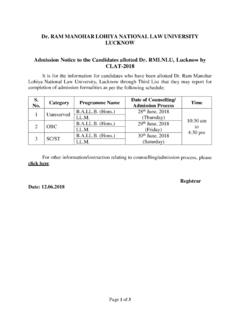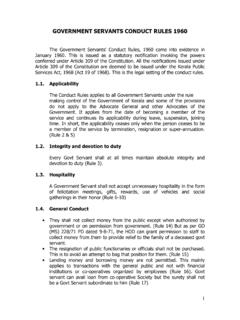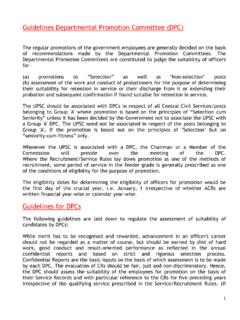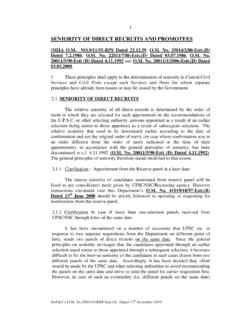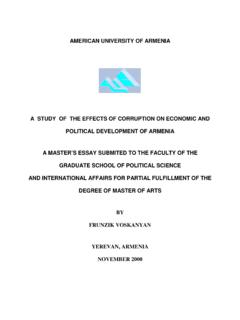Transcription of DISCIPLINARY ACTION VIS-A-VIS GOVERNMENT …
1 1 DISCIPLINARY ACTION VIS- -VIS GOVERNMENT servants - Rajat Pradhan* INTRODUCTION DISCIPLINARY Proceedings, perhaps the most colossal and most litigated branches in India is often characterised as complex and full of intricacies. This branch of Service Matters has the maximum number of commentaries, statutes, rules and regulations governing it. What interested me prima-facie about this topic, is that the procedure of DISCIPLINARY proceedings is conducted through various channels where the delinquent GOVERNMENT servant tries to assert that the allegations against him/her are baseless and the treatment meted to him is unjustified, unwarranted, malicious and arbitrary.
2 The legal battle, the filing of a case in the Public Services Tribunal only takes place after an adverse order has been passed against the GOVERNMENT Servant. The article will deal as to how the DISCIPLINARY proceedings are conducted in the Public service Tribunal, the procedure through which a case is filed and how it is conducted through proper channels. The article will also deal with some of the procedures which are followed in the courts and Tribunals and the legal terms used for them. The writer has made his sincere efforts to illuminate the complex legal concepts of DISCIPLINARY Proceedings and also the various procedures related to it.
3 It is for the same reason that a brief introduction about the Public Services Tribunal and the procedure through which a case moves in the Tribunal is also being mentioned, to acquaint the readers * (Hons.) - II Year, Dr. Ram Manohar Lohiya National Law University, Lucknow, Uttar Pradesh 2 about the procedures followed in the Public Services Tribunal. The following article is being written to illuminate even a lay man about the Public Services Tribunal and to acquaint him with the basic and legal concepts of the DISCIPLINARY Proceedings of the Service matters. The procedures and the various legal formalities observed in the Tribunals which have been cited in the article are based on the legal documents like the Petition, Counter-Affidavits, Charge sheets etc.
4 Through which the author came across during the course of the research. PUBLIC SERVICE TRIBUNAL Till 1970, adjudicating service matters fell under the jurisdiction of Civil Courts. With the passage of time, this branch of Law grew more complex and complicated, hence need was felt for specialised courts and Advocates to deal with the same. The post 1970 era witnessed the setting up of specialised courts or Public Services Tribunals (hereinafter referred to as the Tribunal) which took up cases concerning only service matters. A Tribunal is basically a specialised court, concerning a specific or particular branch of Law.
5 A Tribunal is empowered by the State to decide disputes, concerning a specific matter. Special and specific Tribunals like Debt Recovery Tribunal, Income Tax Appellate Tribunal and Public Services Tribunal etc. are located in different parts of the State. The Public Services Tribunal, its jurisdiction and functioning are governed by Article 323-A of the Constitution of India which runs as follows: Parliament may, by Law, provide for the adjudication or trial by administrative tribunals of disputes and complaints with respect to recruitment and conditions of service of persons appointed to Public services and posts in connection with the affairs of the Union or of any 3 State or of the GOVERNMENT Of India or of any corporation owned or controlled by the The article further provides for the establishment of Administrative Tribunal for the Union and the States, specifies the jurisdiction and powers of such Tribunals.
6 Procedure to be followed by the Tribunals, excludes the jurisdiction of all courts except that of the Supreme Court under article 1362 of the Constitution of India , etc. A question arises by what virtue the State can regulate recruitment and conditions of service of its employees. In service matters, the rule making power is essentially derived from the Constitution of India by virtue of Article 309 which reads as Subject to the provisions of this Constitution, Acts of the appropriate Legislature may regulate the recruitment, and conditions of service of persons appointed.
7 To public services and posts in connection with the affairs of the Union or of any The article further provides that the President in case of Union and the Governor in the case of State may direct such persons to make rules and regulations of services and posts in connection with the affairs of the State, to such services and posts until provision in that behalf is made by or under an Act of the appropriate Legislature under this article, and any rules so made shall have effect subject to the provisions of any such Act. It is essential to point out that only GOVERNMENT servants throughout a State can file their respective cases in the Tribunal, to get their grievances redressed.
8 In other words the Tribunal only hears the cases of servants working in the employment of the State. Employees working 1 Administrative Tribunals PART XIV-A, Article 323-A of the Constitution of India. 2 Special leave to appeal by the Supreme Court. 3 Recruitment and conditions of service of persons serving the Union or a State PART XIV, Chapter I, Article 309 of the Constitution of India. 4 for Private companies or organisations which are not owned by the State cannot file a case in the Tribunal. Such employees are governed by the Industrial Disputes Act and their cases are dealt with by Labour Courts and Industrial Tribunals.
9 It is interesting to note that majority of cases which are filed in the Tribunal are against the State, the State is the Litigator in maximum number of cases. The State is dragged into the Tribunal through its various organs or corporations. This further gives rise to the requirement of Advocates which can represent the State in its cases. The Lawyers which plead the case on behalf of the State are known as the Standing Counsel . Further the judges who preside over the proceedings of the Tribunal are known as the Presiding Officers . DISCIPLINARY PROCEEDINGS Perhaps the most litigated branch of service matters; DISCIPLINARY Proceedings are often characterized as complicated and full of intricacies.
10 DISCIPLINARY Proceedings are initiated against a GOVERNMENT servant who is alleged to have committed a misconduct which is detrimental to the prospects of the concerned department and the same may have also caused a pecuniary loss, etc. The amplitude of DISCIPLINARY Proceedings mainly derives its sanction from the Constitution of India by virtue of Article 311 which reads: Dismissal, removal or reduction in rank of persons employed in civil capacities under the Union or a State: (1) No person who is a member of a civil service of the Union or an all-India service or a civil service of a state or holds a civil post under the Union or a State shall be dismissed or removed by an authority subordinate to that by which he was appointed.
